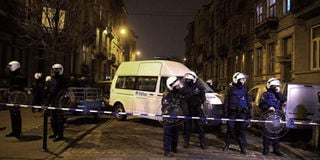Terrorist arrest ends four months of anxiety in Belgium

Police officers at Rue de la Carpe in Molenbeek-Saint-Jean, Brussels on March 19, 2016. Belgian police arrested five people in counter-terrorism raids in Brussels, including November 2015 Paris attacks suspect Salah Abdeslam. PHOTO | AFP
What you need to know:
When news of his arrest was confirmed, people looked at one another cautiously, doubtful and disbelieving.
Then panic hit when two explosions rocked the area — but it was only the police clearing suspect objects, not another raid or shootout.
Before the attacks, the slightly built Abdeslam lived a seemingly ordinary life, running a bar in the Brussels district with his brother Brahim.
BRUSSELS, Saturday
The question on everyone’s lips was “have they got him?” as rumours spread in a run-down Brussels district that Paris attacks suspect Salah Abdeslam had finally been arrested in their midst.
As the rumour morphed into blaring news headlines on TV and the radio, people gathered to see what was happening.
“Maybe after all that, it is for the best,” said one man in his forties from North Africa who asked not to be named, like many in a quarter suspicious of the media and authorities.
There was not much they could see, with heavily armed police officers, many wearing full-face balaclavas, barring entry to Rue Quatre-Vents where Abdeslam was shot and wounded.
When news of his arrest was confirmed, people looked at one another cautiously, doubtful and disbelieving.
Then panic hit when two explosions rocked the area — but it was only the police clearing suspect objects, not another raid or shootout.
ON THE RUN
Abdeslam became Europe’s most wanted man in November after driving several Islamic State militants to their targets in Paris — restaurants, bars, the national sports stadium and most deadly of all, the Bataclan concert hall where 90 of the 130 victims died. He spent four months on the run, with some believing he had fled far.
Before the attacks, the slightly built Abdeslam lived a seemingly ordinary life, running a bar in the Brussels district with his brother Brahim.
“We are surprised. We thought he left Belgium and was living far away,” Ahmed el Khannouss, a councillor, told a French television station.
Brahim blew himself up in the Paris attacks and was buried discreetly on Thursday in a Brussels cemetery. Another attacker, Bilal Hadfi, was buried quietly in the same cemetery last week.
For another resident, Ahmed, 28, “it is not surprising that he should hide out here”.
“He grew up here and even if the area was under constant surveillance, it was surely the best place to hole out. He must have had friends here.”
“IRA guys did the same thing; hiding among the Irish,” said Karim, 48, from the local Oxfam shop close to where Abdeslam was arrested.
“When we knew that something was going on, we went to look out the window. The police were on the ground and the road blocked,” Karim said.
“We heard gunshots but they were muffled, as though indoors, and then all these cars arrived.”
A helicopter flew over the scene. An ambulance leaving a street under police escort was jeered by youngsters.
Still there were locals anxious to get back to their homes, urging the police to let them know when they could get through.
“Maybe this will calm things down,” said Karim. “People who do such things in the name of religion should know that they make everyone suffer.”
Molenbeek, with its large North African immigrant community, had a reputation for Islamic radicalism but the fact that several of the Paris attackers called it home has put it in the global media spotlight.
For Ahmed el Khannouss, that attention is unwelcome.
“The arrest is a relief after four months of tension and anxiety,” said.
“The investigation is going to have to show who, how and why he could keep ahead of the police for months.”
Meanwhile, Abdeslam will oppose his transfer to France and has been formally charged by the Belgian examining magistrate in connection with the November massacre, his lawyer has said.
“In an hour, we will be back (before the judge) on the European Arrest Warrant under which France is seeking his extradition and I can tell you that we will oppose that,” Sven Mary told reporters at federal police headquarters in Brussels.
“He will refuse his extradition at this stage,” Mary said, adding his client was cooperating with the judge.
French President Francois Hollande said shortly after Abdeslam’s arrest in Brussels that he wanted to see him transferred to France quickly.
The European Union’s EAW system was introduced in 2004, specifically to speed up the extradition process, with a judge able to order a transfer from one jurisdiction to another rather than a full court case being needed to decide the matter.
Abdeslam, 26, fled Paris immediately after the attacks, slipping back to his home city of Brussels where he was finally arrested on Friday.





